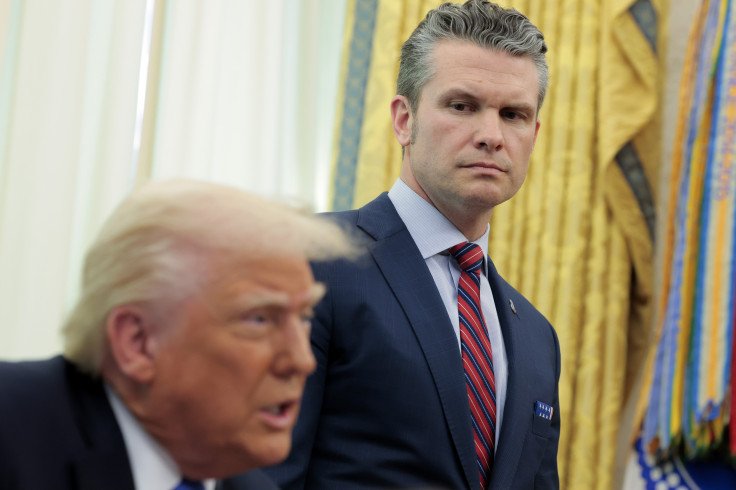
The Fallout from Pete Hegseth’s Security Breach: Implications and Reactions
Pete Hegseth’s Security Breach Sparks Resignation Calls
As someone who’s often scrolling through the latest political news, I stumbled across a startling headline that caught my attention: David French, a well-known columnist, has called for Defense Secretary Pete Hegseth to resign after a shocking security breach. It got me thinking about not just the specifics of the situation, but the broader implications for our national security and how often we overlook such incidents. Wasn’t it just a few months ago that we were grappling with another controversy within the Trump administration? It seems like the thread of communication might just be fraying at the seams.
Understanding the Security Breach
When we think about a security breach, especially in military terms, it’s crucial to understand what that really means. A security breach occurs when sensitive information is accessed without authorization. This can happen through various means, such as hacking, insider threats, or, as we’ve seen recently, improper communication methods.
What Constitutes a Security Breach?
In the military context, a security breach is more than just a technical failure. It involves the potential exposure of classified information that could endanger lives or national security. For example, if a soldier discusses troop movements or strategies in a public forum, that’s a breach. It’s like leaving the front door wide open when you know there are thieves around. The risks are immense.
Insights on the Group Chat Incident
Recently, a significant incident involving Hegseth’s group chat came to light. This chat deviated from established communication protocols. Instead of using secure military channels, sensitive discussions took place on a commercial server. This is alarming. Why would anyone choose an unsecure platform for such critical conversations?
It’s like discussing your bank details in a crowded café. You wouldn’t do that, right? Yet, here we are, with military personnel discussing war plans in a group chat. This raises serious questions about judgment and adherence to protocols. The implications are far-reaching.
Consequences of Discussing Sensitive Information
Discussing sensitive information on unsecure platforms can lead to dire consequences. Here are a few points to consider:
- Exposure of Sensitive Information: When military secrets are shared on insecure platforms, they can easily fall into the wrong hands.
- Endangerment of Lives: If adversaries gain access to troop movements or strategies, it could put soldiers’ lives at risk.
- Legal Repercussions: Individuals involved in such breaches may face disciplinary actions or even criminal charges.
David French, a noted commentator, emphasized this point well:
“National security depends on the integrity of communication.”
This statement underscores the importance of maintaining secure lines of communication within the military.
The Nature of Military Secrets
Military secrets are designed to protect not just information, but lives. Protocols are in place to ensure that sensitive data is shared only through secure channels. These protocols are not just bureaucratic red tape; they are essential for maintaining operational security.
Consider past examples of security breaches that had significant repercussions. The fallout from these incidents often includes loss of trust, operational failures, and in some cases, loss of life. We can’t afford to overlook the lessons learned from history.
Recent Data on Military Communication Breaches
In recent years, the frequency of reported military communication breaches has been alarming. Statistics show that these incidents are on the rise. Each breach not only compromises information but also impacts national security.
For instance, a statistical overview reveals that breaches have led to increased scrutiny of military communications. This can result in tighter restrictions and protocols, which may hinder effective communication among personnel. It’s a double-edged sword.
As we reflect on the incident involving Hegseth’s group chat, it’s clear that we need to take a hard look at our communication practices. Are we doing enough to protect sensitive information? Are we adhering to protocols? These are questions we must ask ourselves.
In conclusion, understanding the implications of security breaches in military contexts is vital. We must recognize the importance of secure communication and the potential consequences of failing to uphold these standards. The integrity of our military operations depends on it.
Reactions from Political Figures and the Media
The recent call for resignation from David French regarding Defense Secretary Pete Hegseth has stirred quite the conversation. French’s remarks were not just casual comments; they were a serious demand for accountability. He argued that Hegseth’s involvement in a group chat on a commercial server, where sensitive war plans were discussed, posed a significant risk to national security. French stated, “One cannot ignore the implications of such lapses in our national security.” This statement encapsulates the gravity of the situation.
David French’s Remarks
French’s rationale for demanding Hegseth’s resignation is rooted in a deep concern for the integrity of military leadership. He believes that discussing sensitive information on unsecured platforms is not just reckless; it’s potentially criminal. In his view, such actions undermine the trust that the public and military personnel must have in their leaders. French’s position is clear: if we cannot trust those at the top, how can we expect our military to function effectively?
Responses from Political Figures
The political landscape is anything but united on this issue. Some figures have rallied behind French, echoing his concerns about Hegseth’s actions. They argue that accountability is essential, especially when national security is at stake. Others, however, have defended Hegseth, suggesting that the situation has been blown out of proportion. They argue that the breach, while serious, does not warrant a resignation.
- Supporters of French: They emphasize the need for strict adherence to security protocols.
- Opponents: They argue that Hegseth’s actions were not malicious and that resignation would set a dangerous precedent.
This division among political figures reflects a broader trend in today’s political climate. Trust in military leadership is being scrutinized more than ever. It raises a question: how do we balance accountability with understanding the complexities of leadership decisions?
The Media’s Role
The media has played a crucial role in amplifying these discussions. News outlets have reported extensively on the breach and the subsequent reactions. They have shaped public perception by highlighting different viewpoints. Some articles focus on the potential consequences of Hegseth’s actions, while others delve into the political ramifications of French’s call for resignation.
Media coverage can sway public opinion. When a story is presented with urgency, it can ignite outrage or support. In this case, the media’s portrayal of the breach has led to a polarized public response. People are either calling for accountability or defending Hegseth, depending on the narrative they consume.
Public Trust in Military Leadership
Recent public polls indicate a decline in trust towards military leadership following this breach. Many Americans are concerned about the implications of such security lapses. They wonder if their leaders are truly capable of protecting national interests. This sentiment is reflected in the data, showing a significant percentage of the population questioning the competence of military leaders.
As we analyze the political climate, it’s clear that military leadership is under intense scrutiny. The historical context of resignations over security concerns adds another layer to this discussion. We’ve seen leaders step down in the past due to similar breaches. Each case serves as a reminder of the importance of maintaining trust and integrity in positions of power.
The reactions to Hegseth’s actions illustrate a divided political landscape where national security is a crucial issue. As we navigate this complex situation, it’s essential to consider the implications of leadership decisions. The stakes are high, and the need for accountability has never been more pressing.
Implications for Military Communication Protocols
In recent discussions surrounding military communication, one incident has raised significant concerns. The breach involving Defense Secretary Pete Hegseth, where sensitive war plans were discussed in a group chat on a commercial server, has sparked outrage. This situation compels us to examine the established protocols for sharing sensitive military information and what reforms may be necessary to prevent future breaches.
Established Protocols for Sensitive Military Information Sharing
Military communication protocols are designed to protect vital information. These protocols dictate how sensitive data is shared, who has access to it, and the channels through which it is transmitted. They are crucial for maintaining operational integrity. However, this recent breach highlights potential weaknesses in these systems.
So, what are these established protocols? Generally, they include:
- Secure Communication Channels: Use of encrypted systems to prevent unauthorized access.
- Access Control: Limiting information access to only those who need it for their roles.
- Regular Training: Ensuring personnel are trained on security measures and the importance of safeguarding information.
Yet, even with these measures, vulnerabilities remain. The incident involving Hegseth raises questions about whether these protocols are being followed or if they need to be updated.
Potential Reforms in Light of Recent Breaches
In light of the breach, we must consider potential reforms. Here are a few ideas that could strengthen military communication protocols:
- Enhanced Monitoring: Implementing stricter monitoring of communication channels to detect unauthorized discussions.
- Stricter Penalties: Establishing harsher consequences for breaches of protocol to deter careless behavior.
- Regular Audits: Conducting frequent audits of communication practices to ensure compliance with established protocols.
These reforms could significantly improve the security of military communications. After all, we must ensure our military communications are safeguarded at all costs. As a military analyst once stated,
“We must ensure our military communications are safeguarded at all costs.”
A Hypothetical Scenario: Hegseth as a Key Decision-Maker
Let’s consider a hypothetical scenario. What if Hegseth had been a key decision-maker in a major military operation? The implications of his breach could have been catastrophic. Sensitive information about troop movements or strategic plans could have fallen into the wrong hands. This could jeopardize not only the success of the operation but also the safety of our troops.
Imagine the chaos that could ensue if critical decisions were based on compromised information. It’s a chilling thought. This scenario underscores the necessity of robust communication protocols and the dire consequences of failing to adhere to them.
The Importance of Secure Communication Channels
Secure communication channels are not just a luxury; they are a necessity in military operations. The stakes are high. A single breach can lead to disastrous outcomes. We must prioritize the security of our communications to protect national interests.
Moreover, previous legislative attempts to improve government transparency regarding security protocols have shown promise. However, they must be coupled with practical measures to ensure that sensitive information is not compromised. Transparency is essential, but it should not come at the expense of security.
Projected Impact of Improved Protocols
Looking ahead, the projected impact of improved protocols on national security is significant. Enhanced security measures could lead to:
- Increased Trust: Military personnel and the public would have greater confidence in the security of military operations.
- Reduced Risks: Fewer breaches would mean a lower likelihood of sensitive information falling into enemy hands.
- Cost Efficiency: While there may be initial costs related to communication security improvements, the long-term savings from avoiding breaches could be substantial.
In conclusion, the breach involving Pete Hegseth serves as a wake-up call. We need to re-evaluate military communication protocols to maintain operational integrity. By implementing necessary reforms and prioritizing secure communication channels, we can protect our national security and ensure that sensitive information remains confidential. The cost of inaction is far too high, and we must act decisively to safeguard our military communications for the future.
TL;DR: Pete Hegseth’s involvement in a group chat about sensitive war plans has sparked a debate on security protocols and accountability in government, leading to calls for his resignation.
- Pete Hegseth, U.S. military breach, national security failure, communication protocol,, group chat scandal, defense secretary controversy, David French resignation demand, military communication reform, security lapse, war plans leak

